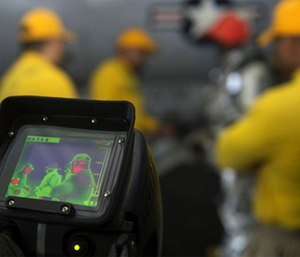
Clearly outline how new TIC technology will benefit fire operation, firefighter safety and nearby fire departments in your grant application
Thermal imaging cameras have evolved from a luxury item for a fire department to an everyday standard piece of equipment. Since their inception, the price tag for thermal imaging cameras has dropped dramatically. Depending on the size of the camera, the cost has dropped by as much as 75 percent.
At the same time, however, having just a single thermal imaging camera on an incident is no longer standard procedure for any department. Improvements in technology and increased training for firefighters on thermal imaging’s capabilities have increased the need for multiple cameras at an alarm to have an effective and efficient incident scene and to ensure firefighter safety.
Even though there has been a drastic drop in the cost of thermal imaging cameras, they are not the only piece of equipment that a fire department should purchase. When you lump its price in with the cost of apparatus, insurance, gear, SCBA and other equipment, departments tend to put off purchasing technology in favor of other needs. This delay can lead to an ineffective fireground operation and a compromise in scene safety.
As a result, departments are constantly looking for funding for technology items like thermal imaging cameras and there are a number of sources available. First in everyone’s mind is the Assistance to Firefighters Grant Program (AFG). Because of their drop in price and their benefits, other funding sources such as financial institutions, insurance companies, community foundations and some corporations are funding requests for thermal imaging cameras.
Application for a thermal imaging camera would fall under the equipment category. Generally, this category receives the third highest number of applications annually, after vehicles and PPE, for AFG funding. To meet AFG’s priority for technology, your request should be for a thermal imaging camera that is a first-time purchase to support an existing mission, or to replace obsolete or damaged equipment. An obsolete thermal imaging camera is defined as one that is eight years old or older, or one that is no longer manufactured. The second priority under this category is for equipment that either increases the capabilities within the department’s existing mission or meets a new risk.
Additional consideration is given to equipment which has a direct effect on the health and safety of firefighters . Consideration is also given to equipment that benefits other departments and equipment that brings your department into compliance with national standards or statutory requirements. A thermal imaging camera certainly addresses these two criteria. However, to get this extra consideration, you must detail how the purchase by your department improves your firefighters’ health and safety, brings your department into compliance and how it will benefit your neighboring departments. In other words, just because a thermal imaging camera generally addresses these priorities, doesn’t mean you will automatically get extra points for it unless you describe how it is going to do so in your specific circumstance.
Regardless of the funding source solicited, there are specific topics you will want to address as you complete your project narratives:
Discuss how these issues are impacting your fireground operations, firefighter safety, civilian safety and fire suppression activities. Then let the grant reviewer know the benefits a new thermal imaging camera will bring to your department. Also discuss other departments and agencies that will benefit from your receipt of a new thermal imaging camera.
As always, plan your application. Start early and give the reviewers pertinent information and hard facts to help them make their decision. Allow someone else to review your application before it is submitted and don’t try to just throw something together because you heard there was money. Believe me, it will show in the quality of your request.
Copyright © 2025 FireGrantsHelp.com. All rights reserved.
